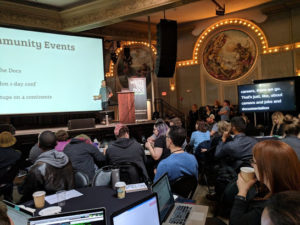Possibly the most exciting thing about my new job as Developer Advocate (there are so many!) is that I don’t have to scramble and ask conferences to fund me anymore. That means that speaker funds can go to the next generation of up-and-coming speakers, independents, and folks who don’t get paid to go to conferences.
It also means that the conferences I go to is not a set restricted by people who can afford speaker sponsorship. I have had to turn down acceptances I was excited about because the conference just couldn’t afford to make it happen, and we were all sad. They wanted to have a range of speakers, I wanted to talk to their audience, but the cash just wasn’t there.
What does it mean to sponsor a conference, as a company? Well, you get your name on slides and promotional materials. Sometimes you get a couple minutes to tell people at the conference what it is you do. You get intangible benefits in good will from conference organizers and attendees. That’s all pretty hard to quantify. But just because something is hard to quantify doesn’t mean it isn’t worthwhile. The conferences you choose to sponsor say a lot about your values as a company. Sponsoring small, inclusive conferences is a relatively meaningful statement. You’re saying you care about the community, and about having a code of conduct, and about nurturing emerging or niche technologies.
Think about sponsoring at a huge conference, like AWS re:Invent. 30,000 people showed up in 2016. Logistically, and in every other way, that’s massive, and sponsorship is expensive, and the impact your company will have is dilute. You’re trying to get the attention of the people in your demographic, in the middle of a vast sponsor hall, in Vegas. You may get enough people to make it worthwhile, but it’ll be hella expensive.
Now think about sponsoring a DevOpsDays conference. Minneapolis is huge, at ~1300. There is a vendor room you can walk in half an hour and the people at the tables have time to talk to you, and are maybe giving a relevant talk. It’s a regional event, so if you’re an employer looking to hire, it’s great to find people, because you know they are already invested in the tech, and are in the area. It’s a way to connect with your community, and I don’t have the numbers to prove it, but I’m going to bet it costs companies a lot less than schlepping enough people to represent at the table to Las Vegas. Target was there, and Merrill, and Optuum. They’re signalling that if you work for them, they care about devops and you might get to go to local conferences, and they’re engaged. That matters a lot! Target is still doing rehabilitation on their local reputation after a set of bad decisions around IT, so it doesn’t hurt to have them showing up and working to be better citizens.
As a company, you should also think about sponsoring really small conferences – the 200-400 range, or even local user groups and meetups around your technology stack. Don’t do it because there’s an immediate payoff, or because you can chart a rate of return, but because it’s the right thing to do to nurture the community you draw from. The goodwill, expertise, community engagement, and candidate leads you get will be so much more valuable, dollar-for-dollar. It’s not always the decision-makers who go to these conferences, but they will be decision-makers eventually, because they are displaying exactly the go-getter values that you want by going to conferences. Think of this as contributing back open source code that you refined in house, only instead of features, it’s cash. Sponsoring these small conferences gives people who can’t travel a chance to meet and aspire and network and connect, and that’s immensely valuable to the circle of practitioners in an area and to the development of the technology as a whole. Working for a big company should not be the only way a brilliant Python developer can make connections with her peers.
I was inspired to write this because North Bay Python is looking for sponsors, and because Alterconf has been an astonishingly effective incubator for speakers, and is ending soon (but you can still say you helped!). I wrote it because I’m going to SeaGL, and they aren’t charging attendees at all. So many of my meaningful conference experiences have happened at conferences that are accessible to everyone, not just people with corporate budgets. Also, if you think about it, conference organizers are like the definition of social superconnectors, and they have Quite Strong positive associations with people who give them money to make the magic happen.
So what can you, a technical writer/developer/ordinary person do about this?
- Talk to your marketing team about what matters to you. They are very smart, but not psychic, and they would love to hear about ways their sponsorship dollar could go further.
- Volunteer for local conferences if you can. It takes a village to fold t-shirts.
- Ask if you can spend recruiting money to sponsor conferences that specialize in the skills you’re looking to hire for. Looking for a functional programmer? Sponsor moonconf.
If you’re running a small-to-medium conference, reply here and I’ll try to put together a link roundup of conferences people could consider sponsoring. Don’t @ me if you don’t have a Code of Conduct, though. It’s 2017, people.
Also? Vote for your local school bonds and levies, while I’m advocating for spending money on systems thinking.
Also also? AWS Re:Invent? You’re charging $1600/ticket and you can’t provide childcare? Really? I mean, it’s not as bad as Grace Hopper. Don’t even get me started on Grace Hopper, but still.

